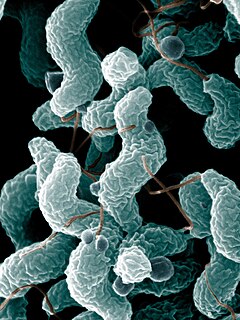Related Research Articles

Epsilonproteobacteria are a class of Proteobacteria. All species of this class are, like all Proteobacteria, Gram-negative.

Raitt's sand eel, also known as the lesser sand eel, is a small semi-pelagic ray-finned fish found in the North Atlantic Ocean. The Raitt's sand eel is member of the family Ammodytidae which includes all 31 species of sand eels, often referred to as sand lances. Contrary to their name sand eels, including Raitt's sand eel, are not true eels and instead belong to the order of “weever-like” fishes, the Trachiniformes.
Alkalimonas is a genus in the phylum Proteobacteria (Bacteria).
Croceicoccus is a genus in the phylum Proteobacteria (Bacteria).
Microbulbifer marinus is a Gram-negative, aerobic bacterium found in marine sediment. Its type strain is Y215T.
Streptomyces hoynatensis is a bacterium species from the genus of Streptomyces which has been isolated from marine sediment from the Black Sea in Turkey.
Streptomyces nanhaiensis is a bacterium species from the genus of Streptomyces which has been isolated from deep sea sediments from the northern South China Sea in China.
Melghirimyces profundicolus is a bacterium from the genus of Melghirimyces which has been isolated from deep-sea sediments from the Indian Ocean.
Flammeovirga pacifica is a bacterium from the genus of Flammeovirga which has been isolated from deep sea sediments from the West Pacific Ocean.
Serinicoccus is a Gram-positive, strictly aerobic and moderately halophilic bacterial genus from the family Ornithinimicrobiaceae. The genus was formerly in the family Intrasporangiaceae, but later genomic data caused it to be reclassified in 2018.
Aestuariicoccus is a Gram-negative and strictly aerobic genus of bacteria from the family of Rhodobacteraceae with one known species. Aestuariicoccus marinus has been isolated from tidal flat sediments from the Yellow Sea in Korea.
Labilibacter marinus is a Gram-negative, non-endospore-forming and rod-shaped bacterium from the genus of Labilibacter which has been isolated from marine sediments from Weihai in China.
Pseudokineococcus marinus is a Gram-positive, aerobic, non-spore-forming and motile bacterium from the genus of Pseudokineococcus which has been isolated from marine sediments from the coast of Jeju in Korea.
Aurantimonas aggregata is a Gram-negative, short-rod-shaped and aerobic bacteria from the genus of Aurantimonas which has been isolated from deep-sea sediments from the Ross Sea in the Antarctica.
Microbulbifer agarilyticus is a bacterium from the genus of Microbulbifer which has been isolated from deep-sea sediments from the Sagami Bay in Japan.
Agromyces marinus is a Gram-negative bacterium from the genus of Agromyces which has been isolated from marine sediments from the beach of Kamogawa in Japan.
Jeotgalibacillus salarius is a Gram-variable, rod-shaped and motile bacterium from the genus of Jeotgalibacillus which has been isolated from sediments from a marine saltern from the coast of the Yellow Sea in Korea.
Galbibacter mesophilus is a Gram-negative and rod-shaped bacterium from the genus of Galbibacter which has been isolated from sediments from the Okinawa Island in Japan.
Salinimicrobium sediminis is a Gram-negative bacterium from the genus of Salinimicrobium which has been isolated from deep-sea sediments.
Sediminicola arcticus is a Gram-negative, psychrophilic, rod-shaped and non-motile bacterium from the genus of Sediminicola which has been isolated from deep-sea sediments from the Arctic Ocean.
References
- 1 2 "Species: Galbibacter marinus". LPSN.DSMZ.de.
- 1 2 3 Li, Chongping; Lai, Qiliang; Fu, Yuanyuan; Chen, Shuangxi; Shao, Zongze (1 April 2013). "Galbibacter marinus sp. nov., isolated from deep-sea sediment". International Journal of Systematic and Evolutionary Microbiology. 63 (Pt_4): 1427–1430. doi:10.1099/ijs.0.044305-0. PMID 22843717.
- ↑ "www.uniprot.org".Cite journal requires
|journal=(help)
| This Flavobacteria-related article is a stub. You can help Wikipedia by expanding it. |